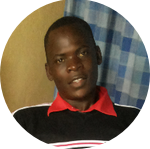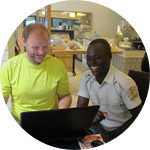About This Project
Kenyan and Tanzanian secondary school students are learning computer science directly through MOOCs (Massive Open Online Courses) and remote mentorship training by networks of volunteer web developers. We want to answer the question, "Do MOOCs or mentoring or some unique combination of both lead to a rise in STEM (Science, Technology, Engineering and Mathematics) graduates in East Africa?"
Ask the Scientists
Join The DiscussionWhat is the context of this research?
Primary School Costs Money
After eighth grade in Kenya, school is no longer free and is financially out of reach for roughly 60% of primary graduates. However, students with access to computers are able to teach themselves basics of computer science through MOOCs and remote mentorships with volunteer computer programmers and web developers.
Volunteers currently come from 4 locations: Africa Nazarene University (http://www.anu.ac.ke), iHub Technology Center (ihub.co.ke), Jonemo Secondary (jonemo.org) and Education For All Children (www.educationforallchildren.org).
Between 2012 and the present, we have worked in partnership with each of these organizations. From 2012-2013 we completed a 1-year weekly remote pilot course in Wordpress, implemented from the US. This course resulted in both attending students receiving jobs doing WordPress development and social media management. They used their earnings to help pay for their university computer semester fees (thus the name "Learn to Earn" was born).
This research project aims to investigate whether this pilot project is an anomaly or reproducible.
What is the significance of this project?
Current Demand
Currently, numerous students from East Africa are expressing interest in enrolling (this is without officially announcing the course) and 6 volunteer professors and technical professionals want to mentor and teach. By the end of enrollment, we expect to have 25 teachers and 10 additional volunteer trainers/professors (mostly from Boston College) in addition to our current 3 volunteer trainers who will help with remote mentoring.
When calculating the multiplier effect of the computer labs and mentors and students attending from 5-7 different regions across East Africa the impact of study will extend to 2500 students across Kenya and Tanzania.
This research project will be included in a 3-credit research project that Israel Kloss will be completing as part of his Boston College MBA coursework.
What are the goals of the project?
Project Objectives
The primary focus of our project is twofold:
1) to train secondary school students in Kenya and Tanzania to learn the basics of Wordpress through mentorship, hands-on activities, presentations and discussions
2) Observe long-term the relationships that form between East Africa CS students and USA volunteers (comprised of Boston College CS students, CS teachers and field experts).
Specific long-term goals of our workshops include:
1) Completely install new computer labs and continue long-term research projects with between 1-4 computer labs for 100-400 students in 4 different Kenyan and Tanzanian communities and tribes.
2) Provide students with Orange and Airtel unlimited internet modems enabling MOOC course attendance and regular attendance of remote mentoring.
3) Study the effect of providing secondary school students from Kenya and Tanzania (East Africa) with the basic training needed to earn their high school and college expenses by winning and completing web development contracts on global job marketplace sites for remote technical workers using computer labs in their schools.
4) Expose students to Coding and programming fundamentals.
5) Determine whether post-coursework test results can uncover STEM success markers in East African students.
Budget
BUDGET
The below budget is the result of post-installation cost analysis of a computer lab which we helped install and fund in Homa Bay, Kenya in 2012 (See the videos of the Jonemo Project).
* 4 Toshiba C50 laptops ($1,400 usd).
* Hp laser jet printer (6,500ksh = 1 per computer lab)
* Windows OS (generic) (5,184.03ksh)
* Mouses (500 ksh * 4 = $23.20)
* Mouse pads (200 ksh * 4 = $9.28)
* Wireless Router (3200 ksh = 1 per computer lab)
* Ethernet cables (6,000 ksh )
* APC/UPS battery backup (8000 ksh = 1 per computer lab)
* Voltage stabilizers (10,280 ksh = 2 per computer lab)
* $700 student stipend for assembly of computer lab and network installation
* $207.10 miscellaneous (cables, wires, repairs, travel reimbursement, fees for wiring funds)
* A 1-year school-wide subscriptions to unlimited Internet access with Orange (Kenya -- http://www.orange.co.ke $156/year).
2014 TOTAL BUDGET
$3,271
Endorsed by
Meet the Team
Team Bio
This research project will be included in a 3-credit research project that Israel Kloss will be completing as part of his Boston College MBA coursework.Israel’s MBA coursework and concentration is in predictive and prescriptive analytics; this research project will involve extensive data collection and analysis and the primary advisor is Dr. John Gallaugher Associate Professor, Information Systems Department.
Skills Mastery Evaluations for both mentors and mentees will be provided by Smarterer
Press and Media
Boston Innovationhttp://bostinno.streetwise.co/all-series/boston-co...
Boston College Heights
http://www.bcheights.com/features/learn-to-earn-trains-african-students-in-computing-design
IHub Updates
http://www.ihub.co.ke/blog/2014/03/learn-to-earn-r...
The Jonemo Project (Founded by one of our org partners, Bryan Gattis)
http://www.youtube.com/watch?v=_tAq1FoVT4I
http://www.youtube.com/watch?v=4Sc1QBiY7w4
The Frontline SMS Alerts Project (Founded by Israel Kloss)
http://www.youtube.com/watch?v=2WwxLfUUPok
Additional Information
WHO'S INVOLVEDDirector
Jennifer Kloss
Founder, Foundations Tutoring Center
www.foundationstutoringcenter.com
USA Lead Advisor
Dr. John Gallaugher
Associate Professor,
Information Systems Department
Technology Coordinator
Israel Kloss
Student, Boston College
Founder, CellAlert.org & Findable.me
East Africa Lead Advisor
Mr. Edward Osoro Ombui:
Deputy HOD Computer and Information Technology
Africa Nazarene University
Additional Advisors
Bryan Gattis
Jonemo Project Founder
and the inspiration behind the "Learn to Earn" project
John Bozeman
Program Chair, Undergraduate Programs
Nick Fegley
Adjunct Professor of Mathematics,
New Hampshire Technology Institute.
INSTITUTIONS INVOLVED
Africa Nazarene University
Nairobi, Kenya
iHub Technology Center
Nairobi, Kenya
Boston College,
Chestnut Hill, MA
VST University College
Igoda, Western Tanzania
Education for All Children (EFAC)
Nairobi, Kenya
CURRICULUM
Prerequisites: A basic understanding of English and 30 words per minute keyboarding skills.
Remote mentors will provide hands-on assistance and ample screen-sharing time allowing each student to directly address any questions.
Lesson 1: The Web Development Infrastructure WAMP (Windows, Apache, MySql, PHP).
How to use Ninite to install baseline of the most important software system.
Interactive Practice Time: Each student will complete PC configuration on their own machine. Remote mentors will review the work of each student, correct errors and offer to answer questions.
Lesson 2: Introduction to Wordpress
A quick overview of menu items, key plugins, configuration, wysiwyg editing and HTML/CSS configuration in the Wordpress Appearance, widgets and customize, menus and background.
Interactive Practice Time: Each student will complete a Wordpress configuration assignment. Remote mentors will review the work of each student, correct errors and offer to answer questions.
Lesson 3: Introduction to HTML/CSS Video: HTML/CSS Basics ( http://www.codecademy.com/tracks/web)
Interactive Practice Time: Each student will complete in-class HTML/CSS assignment.
Remote mentors will review the work of each student, correct errors and offer to answer questions
Lesson 4: Putting It Together: Introduction to HTML/CSS Design In Wordpress
Digging into Wordpress appearance, widgets, menus, background and customize features.
Interactive Practice Time: Each student will complete a Wordpress HTML/CSS assignment. Remote mentors will review the work of each student, correct errors and offer to answer questions
Lesson 5: HTML/CSS Design In Wordpress
Review of prior lesson and more Wordpress appearance, widgets, menus, background and customize features.
Interactive Practice Time: Each student will continue his or her Wordpress HTML/CSS assignment. Remote mentors will review the work of each student, correct errors and offer to answer questions
Lesson 6: HTML/CSS Design In Wordpress
Review of prior lesson and more Wordpress appearance, widgets, menus, background and customize features. Interactive Practice Time: Each student will continue his or her Wordpress HTML/CSS assignment. Remote mentors will review the work of each student, correct errors and offer to answer questions
Lesson 7: What to do when you’re stuck.
Effective solution discovery with Stack Overflow and Google Effective solution discovery is largely related to:
1) Tenacious searching (rephrase, rephrase, rephrase) 2) Incessant reading 3) Creative use of programming language
Interactive Practice Time: Each student will identify a problem they haven’t yet solved or which they are curious about. Remote mentors will identify the answer without giving the student direct answers. Instead, they will help them use StackOverflow.com, Google.com and wordpress.com to answer their own questions.
Lesson 8: Introduction to programming in PHP
Codeacademy.com provides a very helpful and simple introduction to PHP (See http://www.codecademy.com/tracks/php)
Interactive Practice Time: Each student will learn basic PHP by using the “Allow PHP in posts and pages” plugin. Remote mentors will review the work of each student, correct errors and offer to answer questions.
Lesson 9: Introduction to Google Analytics
Students will install the Google Analytics on the web page they have been working on by installing the Google Analytics plugin for Wordpress and then using it to track user behavior and granular analytics. Remote mentors will review the work of each student, correct errors and offer to answer questions.
Lesson 10: Uploading Wordpress to the Server
Students will upload the work from their localhost to a live Internet accessible server and verify the upload was successful and the site looks correct.
Interactive Practice Time: Each student will learn to upload and verify correct Wordpress installation by himself or herself. Remote mentors will review the work of each student, correct errors and offer to answer questions. Remote mentors will review the work of each student, correct errors and offer to answer questions.
Lesson 11: Wordpress Security
Students will learn about vulnerabilities through www.cvedetails.com, wordfence and numerous other helpful Wordpress security-related plugins.
Interactive Practice Time: Each student will change their admin login to a more secure login and other WordPress security best practices. Remote mentors will review the work of each student, correct errors and offer to answer questions.
Skills Mastery Evaluations for both mentors and mentees will be provided by Smarterer
Project Backers
- 58Backers
- 107%Funded
- $3,509Total Donations
- $60.50Average Donation



